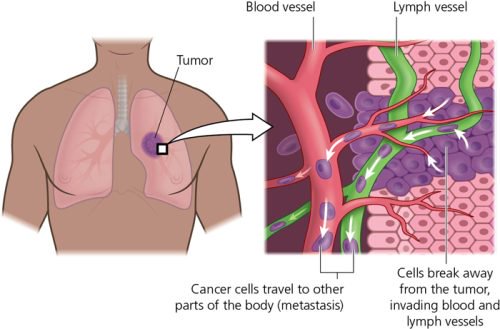This is the second part of our series about the condition based on our patient booklet “Fast Facts for Patients: Non-small Cell Lung Cancer with KRAS Mutation”. This article provides details on what metastatic non-small cell lung cancer (NSCLC) is.
Metastatic cancer (also known as ‘advanced cancer’) means that a cancer has spread from where it first started in the body. A metastatic lung cancer is one that has spread from the lung to another body organ. The cancer cells do this by breaking away from the tumor and traveling through the bloodstream or the lymphatic system. The cells settle somewhere else and start to grow into new tumors.

Primary and Secondary Cancer
Where the cancer starts is called the primary cancer. Where the cancer spreads to is called a secondary cancer.
NSCLC can spread to several places, such as the bones, liver, and brain. Because the cells that have spread are lung cancer cells, it’s still a lung cancer, not a liver or bone cancer. It’s important to understand this. Because these secondary cancers are made of lung cancer cells, they will respond best to treatment that has been proven to treat lung cancer, not primary liver cancer or primary bone cancer.
Sometimes cancers aren’t found until they’ve already spread. A primary cancer may be small and cause few or no symptoms. But if cells have broken away from the main tumor and started to grow elsewhere, these secondary cancers may cause symptoms that lead to diagnosis.
Finding Out That You Have Metastatic Cancer
It’s a shock to find out a cancer has spread. Whether it’s come back after earlier treatment for a primary cancer or had already spread when you were diagnosed, it’s difficult news to hear. It’s also difficult news to pass on to your close friends and family.
People may tell you to ‘keep positive’ or even that ‘being positive will help fight your cancer’. But there’s no right or wrong way to feel. You don’t have to keep up a cheerful front all the time. You can have a positive attitude and still feel worried or upset.
Reliable sources of support and information are important. It may help to talk to others in the same situation as you. The internet makes this easier than ever. There are also likely to be local support groups where you can meet other people affected by cancer. Ask at your cancer center. You can also ask your healthcare team about available mental health/counseling resources, care giver support, or financial planning help.
Positivity also means being hopeful. New treatments are being developed all the time. In fact, that’s what this booklet is about. There are now more treatments for metastatic lung cancer than ever before. Even if it’s not possible to completely get rid of your cancer, there are treatments that might control it.
Your family and friends will want to support you, even if they are worried and not sure how best to do it. Let them know what you need. Just listening to you while you talk through concerns can be a great help.
Commonly Used Words
There are lots of different terms that doctors use about cancer, and it helps to know what they mean.
The primary cancer site is where the cancer first started growing in the body. With NSCLC, the primary cancer site is the lung.
A secondary cancer site is where a primary cancer has spread to. It’s the same type of cancer as the primary cancer, just growing somewhere else in the body.
Metastatic cancer (sometimes called mets) means a cancer that has spread to another part of the body.
You may hear your doctor talk about staging. This is how doctors describe how far a cancer has grown and whether it has spread. There are usually four main cancer stages. A small, localized cancer is stage 1. A stage 4 cancer means the same as metastatic cancer – a cancer that has spread to another part of the body.
Information based on Fast Facts for Patients: Non-small Cell Lung Cancer with KRAS Mutation (Karger, 2023).





Comments
Share your opinion with us and leave a comment below!